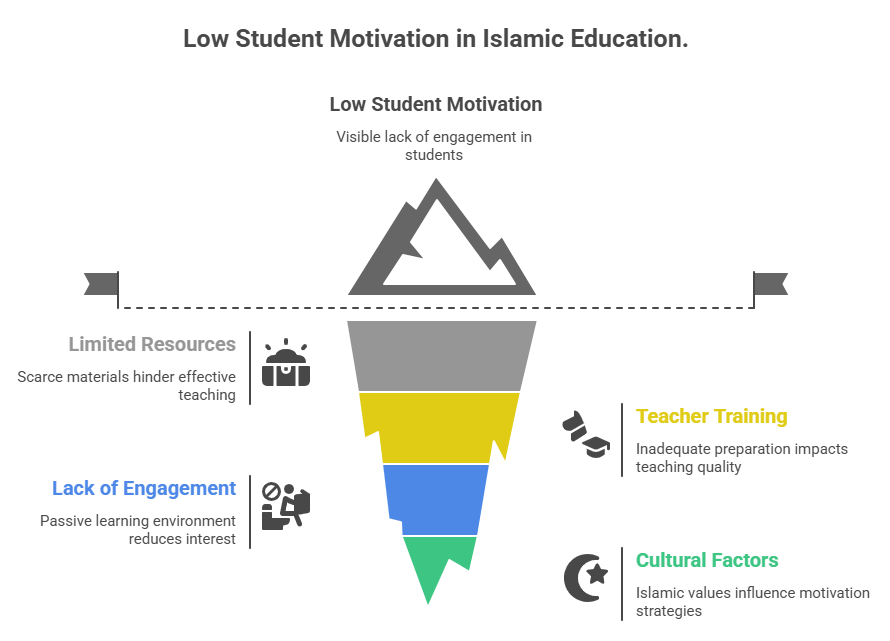Enhancement of Learning Motivation Through Active Teacher Participation at Madrasah Ibtidaiyah Negeri 6 Pesisir Selatan
Main Article Content
Abstract
The global challenge of low student motivation in education is particularly pronounced in underserved regions, where limited resources and teacher training exacerbate the issue. This problem is critical in Islamic education, where fostering motivation is essential for both academic and moral development. This study investigates how the active participation of Islamic Education teachers at MIN 6 Pesisir Selatan, a rural coastal school in West Sumatra, enhances student motivation. Using a mixed-methods case study design, data were collected through semi-structured interviews, classroom observations, and questionnaires involving 15 teachers and 30 students. The findings reveal that teachers' active participation, manifested through physical and non-physical classroom arrangements, mediation, and constructive evaluation, significantly boosts student motivation. Key strategies include creating a supportive learning environment, using engaging materials, providing positive feedback, and fostering cooperation. These methods align with Islamic values, emphasizing empathy and moral guidance, and were validated through triangulation, ensuring reliability. This study addresses its objectives by 1) identifying current motivation levels, 2) analyzing teachers' roles, and 3) demonstrating their impact. However, limitations include its focus on a single institution, which may affect generalizability, and the reliance on self-reported data, which could introduce bias. Future research should explore scalability in diverse Islamic educational contexts and investigate the role of digital tools in enhancing engagement
Downloads
Article Details

This work is licensed under a Creative Commons Attribution-NonCommercial 4.0 International License.
References
[1] C. Cassidy, H. Marwick, C. Dwyer, and E. Lucas, “Creating a learning environment conducive to children’s well-being through philosophy with children in a Scottish classroom,” Educ. 3-13, vol. 52, no. 5, pp. 635–647, 2024, doi: 10.1080/03004279.2022.2125333.
[2] H. Kamal, M. Ritonga, and A. Mudinillah, “Fiqh Learning at Madrasah Ibtidaiyah: Enhancing Students’ Academic Performance through a Collaborative Learning Model,” AL-ISHLAH J. Pendidik., vol. 16, no. 2, pp. 2863–2877, 2024, doi: 10.35445/alishlah.v16i2.5055.
[3] M. Uyun, Y. Bahriah, and F. Fitriani, “Interest and learning motivation with student participation,” Psikoislamedia J. Psikol., vol. 7, no. 2, pp. 119–133, 2022, doi: 10.22373/psikoislamedia.v7i2.13794.
[4] J. Reeve and S. H. Cheon, “Autonomy-supportive teaching: Its malleability, benefits, and potential to improve educational practice,” Educ. Psychol., vol. 56, no. 1, pp. 54–77, 2021, doi: 10.1080/00461520.2020.1862657.
[5] A. Salim, A. Lahmi, and A. Rasyid, “Kontribusi Kompetensi Profesionalisme Guru terhadap Peningkatan Motivasi Belajar Pendidikan Agama Islam,” Ruhama Islam. Educ. J., vol. 3, no. 2, pp. 1–14, 2020, doi: 10.31869/ruhama.v3i2.2219.
[6] S. E. Kassab, R. Rathan, D. C. M. Taylor, and H. Hamdy, “The impact of the educational environment on student engagement and academic performance in health professions education,” BMC Med. Educ., vol. 24, no. 1, 2024, doi: 10.1186/s12909-024-06270-9.
[7] L. Mandouit and J. Hattie, “Revisiting ‘The Power of Feedback’ from the perspective of the learner,” Learn. Instr., vol. 84, p. 101718, 2023, doi: https://doi.org/10.1016/j.learninstruc.2022.101718.
[8] I. Patra, A. Alazemi, D. Al-Jamal, and A. Gheisari, “The effectiveness of teachers’ written and verbal corrective feedback (CF) during formative assessment (FA) on male language learners’ academic anxiety (AA), academic performance (AP), and attitude toward learning (ATL),” Lang. Test. Asia, vol. 12, no. 1, 2022, doi: 10.1186/s40468-022-00169-2.
[9] A. Asmawati, M. Ritonga, and A. Lahmi, “the Relationship Between Madrasah and Teacher Learning Style With Arabic Learning Outcomes,” Linguist. J. Bhs. dan Sastra, vol. 6, no. 2, p. 356, 2021, doi: 10.31604/linguistik.v6i2.356-367.
[10] H. Hotmaida, M. Ritonga, and M. Mursal, “Pembelajaran Pendidikan Agama Islam Di Sekolah Dasar: Analisis Terhadap Kompetensi Guru, Strategi Dan Kualitas Hasil,” Ruhama Islam. Educ. J., vol. 3, no. 2, pp. 29–42, 2020, doi: 10.31869/ruhama.v3i2.2221.
[11] I. Munawaroh, M. Ali, and Asep Herry Hernawan, “The Role of Teachers and Islamic Activities In Developing The Character of Students,” Edukasi Islam. …, vol. 12, no. 3, pp. 2107–2120, 2023, doi: 10.30868/ei.v12i03.4468.
[12] S. S. Ihwani, M. T. Ajmain, Jima’ain, and Z. N. Rashed, “The Role Of Teachers In Embedding Islamic Values And Ethics In Education: A Literature Review,” AL-WIJDÃN J. Islam. Educ. Stud., vol. 8, no. 3, pp. 335–342, 2023, doi: 10.58788/alwijdn.v8i3.2466.
[13] H. L. Tosi, “The Academy of Management Review,” Acad. Manag. Rev., vol. 16, no. 2, pp. 480–483, Mar. 2025, doi: 10.2307/258875.
[14] Y. H. Jeong, L. C. Healy, and D. McEwan, “The application of Goal Setting Theory to goal setting interventions in sport: a systematic review,” Int. Rev. Sport Exerc. Psychol., vol. 16, no. 1, pp. 474–499, 2023, doi: 10.1080/1750984X.2021.1901298.
[15] M. Manninen, R. Dishman, Y. Hwang, E. Magrum, Y. Deng, and S. Yli-Piipari, “Self-determination theory based instructional interventions and motivational regulations in organized physical activity: A systematic review and multivariate meta-analysis,” Psychol. Sport Exerc., vol. 62, p. 102248, 2022, doi: https://doi.org/10.1016/j.psychsport.2022.102248.
[16] T. Luo and A. Derakhshan, “Examining the role of classroom climate and teacher-student relationships in EFL students’ perceived learning outcomes: A self-determination theory perspective,” Learn. Motiv., vol. 88, p. 102062, 2024, doi: https://doi.org/10.1016/j.lmot.2024.102062.
[17] S. ?. Konrad, J. L. Vodopivec, and T. Štemberger, “Classroom Climate and Student–Teacher Relationship: A Study Among Students and Teachers in Slovenia,” Eur. J. Educ. Res., vol. 13, no. 3, pp. 1411–1420, 2024, doi: 10.12973/eu-jer.13.3.1411.
[18] E. L. Deci and R. M. Ryan, Intrinsic Motivation and Self-Determination in Human Behavior. New York: Springer, 1985. doi: 10.1002/9781119547143.ch61.
[19] A. Bandura, “Self-Efficacy: The Exercise of Control,” 1977.
[20] Yulisna et al., “Online Learning During the Covid-19 Pandemic Period: Studies on the Social Presence and Affective and Cognitive Engagement of Students,” Int. J. Early Child. Spec. Educ., vol. 14, no. 1, pp. 479–486, 2022, doi: 10.9756/int-jecse/v14i1.221058.
[21] C. A. Brenner, “Self-regulated learning, self-determination theory and teacher candidates’ development of competency-based teaching practices,” Smart Learn. Environ., vol. 9, no. 1, p. 3, 2022, doi: 10.1186/s40561-021-00184-5.

